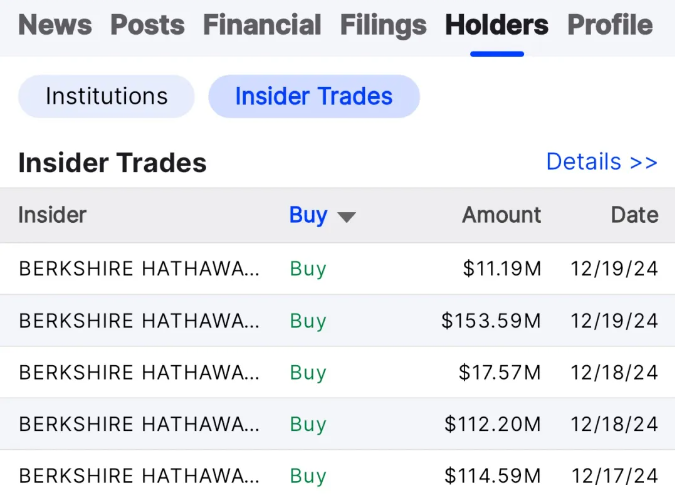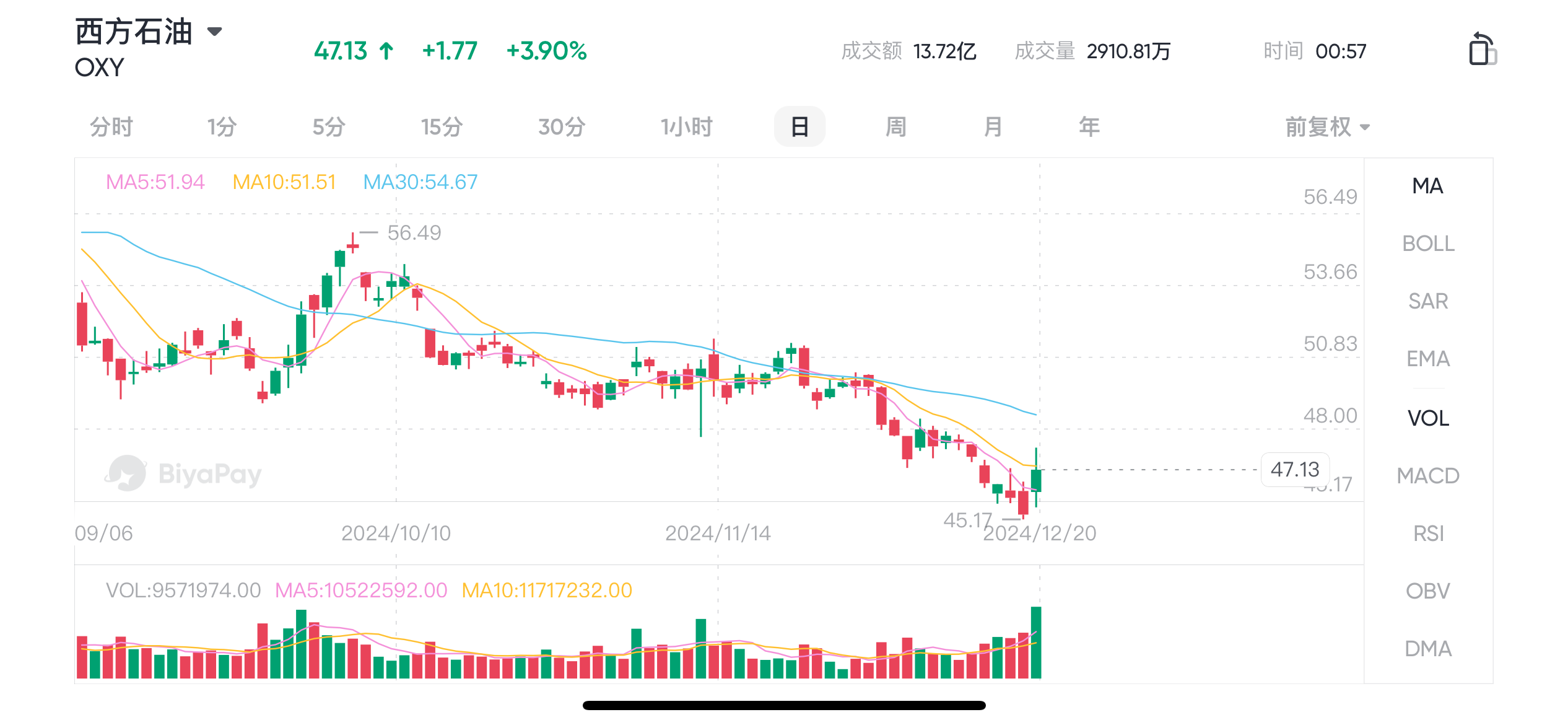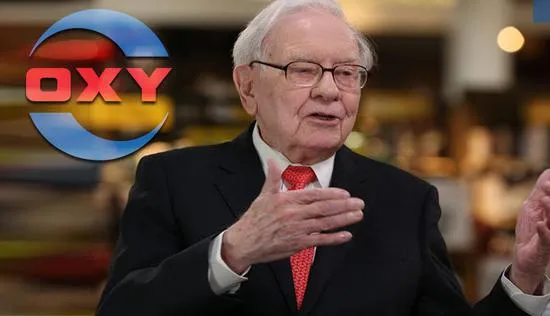- EasyCard
- Trade
- Help
- Announcement
- Academy
- SWIFT Code
- Iban Number
- Referral
- Customer Service
- Blog
- Creator
Buy more as the price drops, yet the price keeps falling after buying. "Stock God" Warren Buffett has increased his stake in OXY again! Why is the stock god so fond of oil stocks?
To make money from investments, one must buy valuable assets at low prices. But how can we tell which assets are valuable?
When you’re still new to financial management, it might be a good idea to follow the “smart money”. For example, the author firmly holds the S&P 500 and the Nasdaq, mainly because of following Buffett’s advice.
In addition, during continuous learning, the author also found that Buffett is very fond of another investment target - oil. At this year’s Berkshire Hathaway annual shareholders’ meeting, Buffett talked about the investment value of oil like this:
“We don’t know what the oil price will be next year. I don’t think anyone knows either, but I think this is a very good opportunity. For Berkshire Hathaway, increasing the stake in Occidental Petroleum is a correct decision and a valuable investment. We will keep investing.”
In the past two years, Buffett has clearly been bullish on oil stocks. In March 2023, he increased his stake in Occidental Petroleum by 13.6887 million shares; from May to June 2023, he added 16.0888 million shares; in the fourth quarter of 2023, he bought an additional 19.5866 million shares; in February this year, he bought 4.3 million shares; and in June this year, he increased his stake by 2.5655 million shares.
On the eve of Christmas, taking advantage of the sharp decline in the US stock market in recent days, Buffett increased his stakes in several companies, once again demonstrating his investment philosophy of “being greedy when others are fearful”. According to the data, “Stock God” Buffett increased his stake in Occidental Petroleum (OXY) again.
The stock god suddenly made a move and swept the US stock market
The data shows that Berkshire Hathaway, Buffett’s company, bought the stocks of three companies, Occidental Petroleum, Sirius XM, and VeriSign, within three days last Tuesday, Wednesday, and Thursday, with a total purchase amount of over $560 million.

Specifically, Berkshire Hathaway increased its stake in Occidental Petroleum by nearly 8.9 million shares at a price of $405 million. Currently, Berkshire Hathaway’s shareholding in Occidental Petroleum exceeds 28%. This is the first time Buffett has increased his stake in Occidental Petroleum’s stock in six months. It is understood that Occidental Petroleum is Berkshire Hathaway’s sixth largest holding stock, behind Apple, American Express, Bank of America, Coca-Cola, and Chevron. Buffett once said that Berkshire Hathaway has no intention of fully acquiring Occidental Petroleum.
In addition, Berkshire Hathaway also bought about 5 million shares of Sirius XM for about $113 million and about 234,000 shares of VeriSign for about $45 million.
Compared with the transaction of Occidental Petroleum, the scale of Sirius XM and VeriSign is much smaller. Therefore, media analysis suggests that the latter two transactions may have been carried out by Buffett’s investment deputies, Todd Combs and Ted Weschler.
Analysis shows that Buffett took advantage of the market correction. The share prices of the three stocks he chose to increase his stake in are relatively cheap. Calculated at the latest closing price, the share price of Occidental Petroleum has fallen nearly 20% this year. The share price of satellite radio company Sirius XM has fallen 56.4% so far this year. Currently, Berkshire Hathaway’s shareholding in the company has increased to about 35%. Buffett chose to increase his stake in Sirius XM after billionaire John Malone’s Liberty Media completed the transaction of merging its tracking stock with the rest of the audio entertainment company in early September. Internet company VeriSign has also had a tough year, with its share price falling more than 3% this year, performing far behind the technology sector. Berkshire Hathaway first bought this technology stock in 2013 and has not adjusted its shareholding ratio for years.
However, after the news of the “stock god” making a move came out, all three stocks rose overnight. As of the close on December 20, Occidental Petroleum rose nearly 4%, Sirius XM rose 12.15%, and VeriSign rose 2.79%.

The market believes that even after the rise last Friday, Occidental Petroleum is still the fifth worst-performing component stock in the S&P 500 Energy Index this year. Investors are worried about the company’s debt level before the expected period of low oil prices arrives. However, Buffett’s investment may indicate his confidence in Vicki Hollub, the CEO of Occidental Petroleum.
Why is Buffett so fond of Occidental Petroleum?
Let’s take a look at the origin of Buffett and Occidental Petroleum.
Buffett’s investment in Occidental Petroleum began in 2019. Since the first quarter of 2022, Berkshire Hathaway has bought a large number of Occidental Petroleum stocks for three consecutive quarters, increasing its shareholding in Occidental Petroleum to 27% and becoming the single largest shareholder of Occidental Petroleum.
In August 2022, Berkshire Hathaway obtained permission from the US Federal Energy Regulatory Commission to purchase up to 50% of Occidental Petroleum’s shares. Subsequently, Buffett continued to increase his stake.
Buffett revealed in May last year that he is not seeking to fully acquire the company. However, Berkshire Hathaway may indeed buy more shares of Occidental Petroleum, and the company usually prefers to buy at a price below $60 per share.

What exactly makes OXY so favored by Buffett?
First, Buffett believes that oil and gas production helps the United States alleviate its energy dependence, which is in line with the interests of shareholders and the country.
At a time when countries around the world have reached a consensus on vigorously developing clean new energy, Buffett has been continuously buying traditional energy companies. Many investors, both in the United States and China, don’t quite understand this. After all, it is an inevitable trend that traditional oil energy will be replaced by new energy in the near future. Even OPEC predicts that the peak of oil demand will be in the next few years.
In May 2019, when Buffett was interviewed by CNBC and asked about the merger of Occidental Petroleum and Anadarko Petroleum, he replied: Berkshire Hathaway’s investment in Occidental Petroleum is mainly a bet on the long-term oil price (bet on long-term oil price more than anything).
Note the words “long-term” price. In Buffett’s eyes, a period of at least 10 years can be considered long-term. In many subsequent interviews and Q&A sessions at Berkshire Hathaway’s annual meetings, Buffett said that he does not agree with the view that anything can replace oil and traditional energy in the short term.
We should realize that getting rid of dependence on oil is not as easy as we think. According to a research report, the largest proportion in China’s current oil consumption is gasoline and diesel for transportation, which is the area most likely to be replaced by new energy vehicles, but it only accounts for 37%.
The proportions of oil used in the chemical industry, industry, and other uses account for 22%, 12%, and 24% of China’s total oil consumption respectively. These demands and uses cannot be replaced by new energy. Moreover, such demands are still growing. The basic materials used in new energy, such as aluminum, nickel, lithium, monocrystalline silicon, and polycrystalline silicon, are basically high-energy-consuming materials.
That is to say, to achieve the transformation from traditional energy to new energy in the short term, more traditional energy is needed. The expectation that new energy will replace traditional energy has led energy companies to significantly reduce their investment in traditional energy exploration, which in turn has led to a short-term shortage of traditional energy. The Russia-Ukraine conflict has made countries more aware of the strategic value of oil and gas energy.
Second, the location of Occidental Petroleum’s oil exploration
Public information shows that Occidental Petroleum is an international oil and gas exploration and production company headquartered in Los Angeles, the United States. Its main businesses include oil and gas exploration and development, chemical business, and natural gas transportation. It is currently one of the largest shale oil producers in the world.
Occidental Petroleum currently focuses on its shale oil assets in the Permian Basin in the United States. Among the shale oil assets in the United States and even the world, the oil and gas resources in the Permian Basin are the best. The reserves are huge. It is estimated that at the current development rate, it can be exploited for about 50 years, and the average exploitation cost is the lowest.
If the oil price drops in the future, the first to suffer losses will be shale oil projects around the world other than those in the Permian Basin. The break-even oil price for the Permian Basin is the lowest among global shale oil. This is similar to the low-cost position of Middle Eastern oilfields among global conventional oilfields, with the lowest break-even point.
An important feature of shale oilfield exploitation is that the time from exploration to exploitation is very short, then the production declines rapidly, and the investment payback period is short. If the oil price surges in the future, Occidental Petroleum, which focuses on Permian Basin shale oil, can quickly increase production and obtain huge profits.
If the oil price drops sharply, Occidental Petroleum can stop developing new oilfields, and the oil and gas production will drop rapidly, with the loss amount controllable.
If the oil price collapses, Occidental Petroleum will also suffer heavy losses. But the possibility of a sudden collapse in the future oil price is considered very small. Occidental Petroleum is in a relatively advantageous position in the industry. Most oil companies cannot maintain their current production levels for a long time due to insufficient oil and gas reserves.
We note that Buffett doesn’t only hold Occidental Petroleum among oil stocks. He also holds Chevron with a larger scale, with a market value of $260 billion. Both are among the top ten holdings.
Chevron and Occidental Petroleum are the top two landowners in the Permian Basin in the United States, and the Permian Basin is the core area for future shale oil production increase in the United States.
Charlie Munger once said at the annual meeting: “Holding these two companies is equivalent to owning the oil and gas resources in the Permian Basin.”
Third, from the perspective of shareholder returns
In 2023, only three oil and gas companies achieved positive shareholder return growth, namely Chevron, Occidental Petroleum, and ExxonMobil.
The year-on-year decline in cash flow of major oil and gas companies in 2023 is around 20 - 25%. Maintaining positive shareholder return growth under such circumstances is the greatest advantage of these three companies. The proportion of shareholder return to free cash flow of Occidental Petroleum and ExxonMobil has increased to over 90%, while that of Chevron has increased to over 120%.
Compared with peers, we can see that Chevron and Occidental Petroleum have the smallest capital expenditures in the industry, but they also have the best shareholder returns.
At the 2021 annual report meeting, the CEO of Occidental Petroleum said that the company will no longer carry out large-scale production increases and mergers and acquisitions in the future. The money earned will be used to reduce the company’s debt first, then redeem preferred shares, and then resume dividend payments and share buybacks.
Buffett said at the shareholders’ meeting that after learning that Occidental Petroleum gives priority to repaying debts and will not expand aggressively in the future, this is one of the important reasons for his decision to buy back Occidental Petroleum’s shares.
Finally, Buffett’s appreciation for the CEO of Occidental Petroleum
In 2016, 56-year-old Vicki Hollub became the first female CEO of Occidental Petroleum and also the first female CEO in the oil industry. In this traditional male-dominated industry, Vicki Hollub has shone brightly.
In 2019, Vicki Hollub acquired Anadarko Petroleum, a peer company, for $38 billion.
Anadarko owned 240,000 acres of land in the Permian Basin, most of which was connected. Through this acquisition, Occidental Petroleum obtained Anadarko’s high-quality oil wells in the local area. At the same time, it also took on a lot of debt.
This led to the CEO who led this acquisition, Vicki Hollub, facing continuous controversy and fierce criticism from investors. At the most difficult time, she even faced the risk of being dismissed. But in the end, the rise in oil prices and the rebound in the company’s share price proved that this transaction was very successful.
Buffett has praised this female entrepreneur repeatedly and has spoken highly of her in public many times. He said: “We are very familiar with the management of Occidental Petroleum. They have done a lot of good things and built many new wells while still making a profit.”
After the above analysis, how should investors start?
Based on the above logic, the author believes that in the long run, oil is a high-quality asset.
Especially if Donald Trump comes to power next year, there is a high probability that new energy will be suppressed and traditional energy will be revived in the United States. Coupled with the situation in the Middle East, especially the complex relationships among Iran, Israel, and the United States, if the unrest in the Middle East intensifies, there is a possibility that the oil price will rise significantly. Moreover, in the long run, the demand for oil as human energy and raw materials will increase in the short term. Therefore, Occidental Petroleum is a very good target in terms of safety margin and moat.
In summary, Buffett’s act of increasing his stake in Occidental Petroleum’s stock is the result of comprehensive considerations, including confidence in the company’s long-term value, optimism about the energy industry, trust in the management, expectations of financial returns, and interpretation of market conditions.
Although the oil price has dropped recently and some people think that Occidental Petroleum is not good and Buffett shouldn’t choose it. But what if the oil price reaches $100 in the future? At that time, the performance and share price of Occidental Petroleum will be very impressive.
Finally, the author wants to say that this may be a little inspiration Buffett gave to the market before Christmas - looking for stability in uncertainty and finding direction in fluctuations. I hope every investor can seize the cross-year market opportunity, find their own chance, and lay a solid foundation for the new year.
*This article is provided for general information purposes and does not constitute legal, tax or other professional advice from BiyaPay or its subsidiaries and its affiliates, and it is not intended as a substitute for obtaining advice from a financial advisor or any other professional.
We make no representations, warranties or warranties, express or implied, as to the accuracy, completeness or timeliness of the contents of this publication.




Contact Us
Company and Team
BiyaPay Products
Customer Services
is a broker-dealer registered with the U.S. Securities and Exchange Commission (SEC) (No.: 802-127417), member of the Financial Industry Regulatory Authority (FINRA) (CRD: 325027), member of the Securities Investor Protection Corporation (SIPC), and regulated by FINRA and SEC.
registered with the US Financial Crimes Enforcement Network (FinCEN), as a Money Services Business (MSB), registration number: 31000218637349, and regulated by FinCEN.
registered as Financial Service Provider (FSP number: FSP1007221) in New Zealand, and is a member of the Financial Dispute Resolution Scheme, a New Zealand independent dispute resolution service provider.



















